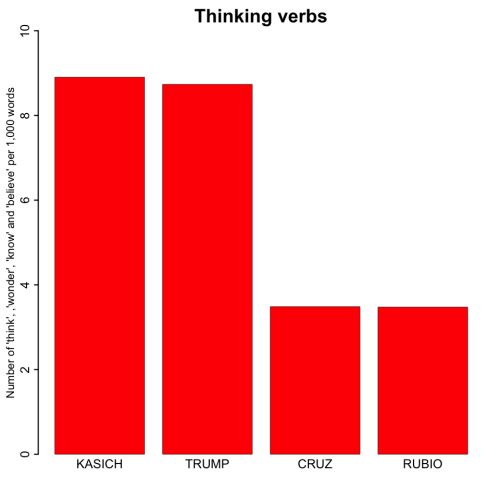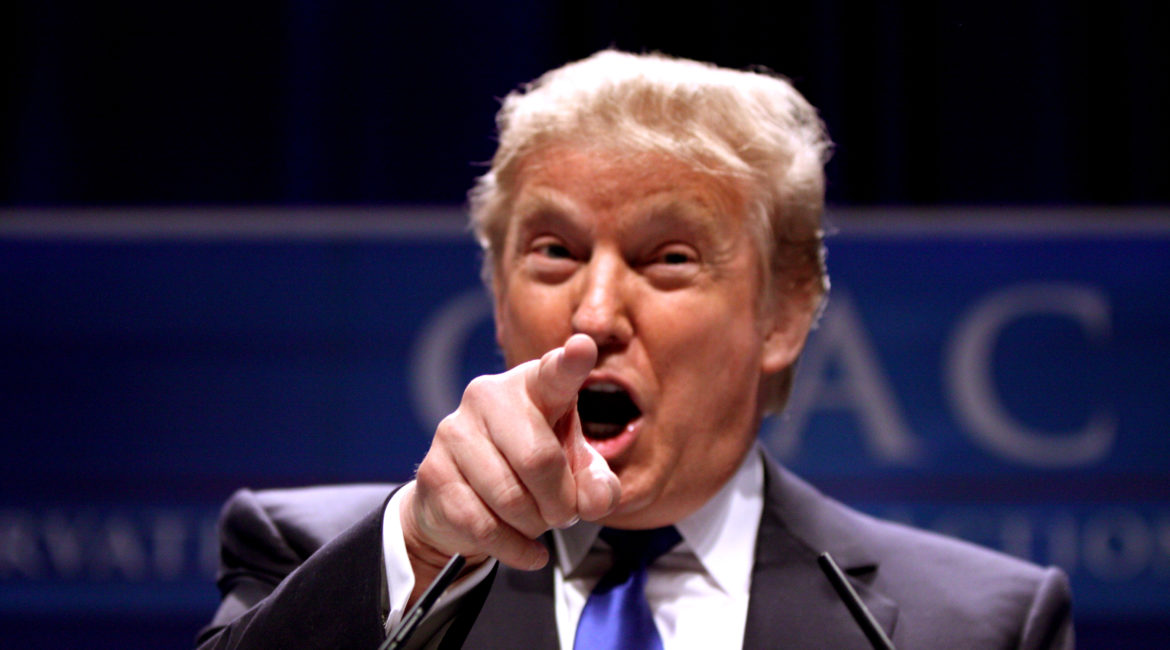Here, we present a computational analysis of language use in the Republican debate, looking at each candidate’s rhetorical style. Donald Trump, it turns out, is a man of many, but short words; John Kasich loves asking questions; and Marco Rubio and Ted Cruz rely a lot on emotionally charged language.
Four presidential hopefuls met for a heated exchange of ideas at the Republican Presidential Primary Debate last night: Donald Trump, Ted Cruz, Marco Rubio and John Kasich. Each of them tried to present a persuasive argument on stage; but what kind of rhetorical style did they use to do so?
This blog post presents a short analysis of the candidates’ language use (based on the transcript published by the Washington Post).
For each candidate we calculated:
- the number of words used (who speaks the most?),
- the average length of their words and sentences (who uses simple language?),
- the use of negative and positive emotion words such as bad or terrific (who has a positive message?) ,
- the number of questions asked (well, who asks a lot of questions?),
- and the use of thinking verbs such as know or believe (who uses direct language?).
Word and sentence length: keeping it simple
In terms of quantity, Donald Trump won the debate handily: He got to say more than 6500 words, with Cruz coming in second (3700 words) and Rubio third (3500 words). Total word count for John Kasich is 3300.
Looking at the kinds of words the candidates used, we see in the graph below that Donald Trump uses a lot of short words (his average word length in characters is 3.85), while Ted Cruz tends to use longer words (average word length 4.34 characters). Short words are often used as an indicator of the complexity of the vocabulary: learned words and technical terms tend to be longer than basic vocabulary. (Consider for instance automobile versus car).
One could argue that when it comes to word choice, Donald Trump is keeping things simple by using short words, presumably trying to make his argument easy to follow.
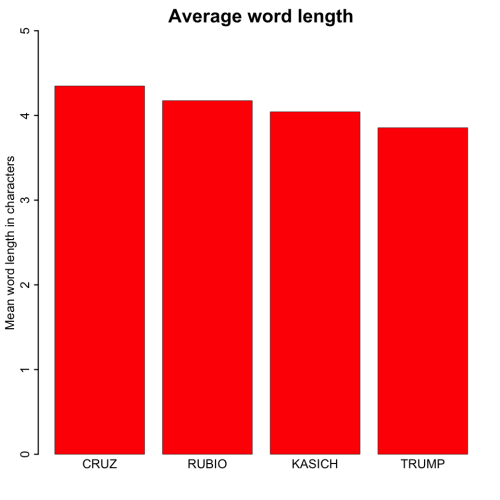
Trump’s approach to constructing sentences is very similar: he keeps things short. His sentences are on average pretty exactly 70 percent shorter than Ted Cruz’s. (Note that this statistic includes incomplete sentences, for example when a candidate is interrupted by someone else).
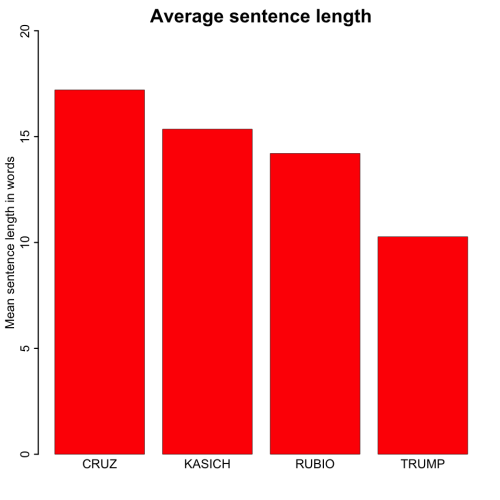
How about this?: asking questions
John Kasich might not have talked a lot during the debate, but he sure did get a lot of questions in. Marco Rubio, on the other hand, did not appear too interested in other people’s input. The graph below shows the number of questions each candidate asked. To make comparison easier, the graph shows the number of questions per 1,000 words: It shows that statistically, a 1,000 word-chunk produced by Kasich during the debate contains 5.5 questions. This compares to 1.2 questions in 1,000 words from Marco Rubio, etc. (It’s just like percent, except with 1,000 instead of 100).
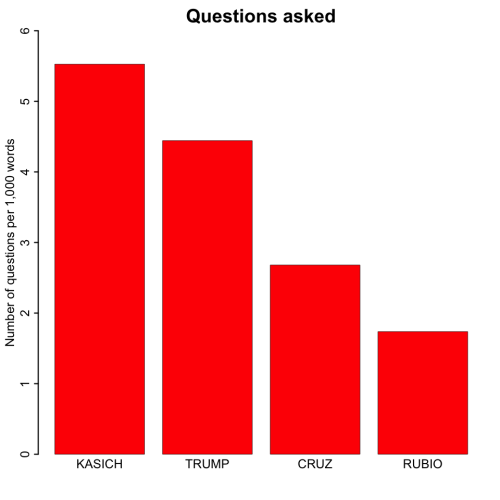
Opinion words: delivering a positive / negative message
Here we see the number of positive and negative opinion words (based on a list compiled by Bing Liu et al. for this paper), again calculated per 1,000 words uttered. This word list does not only contain obvious negative words like bad, but also words like danger that are negatively connotated. The count includes plural, past and participle forms. Marco Rubio uses a lot of emotional language in general; he definitely leads the use of negative opinion words. (He seems especially fond of the word attack). Kasich seems to try hardest to keep things positive.
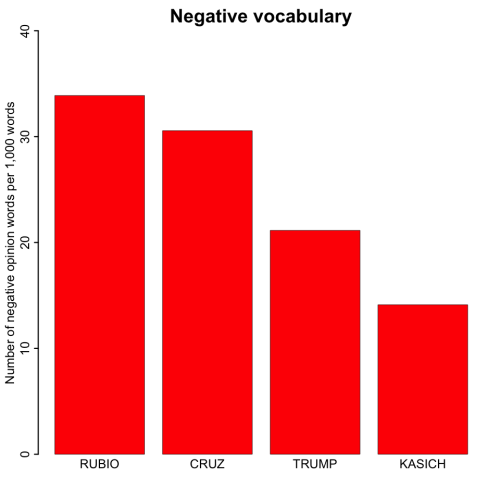
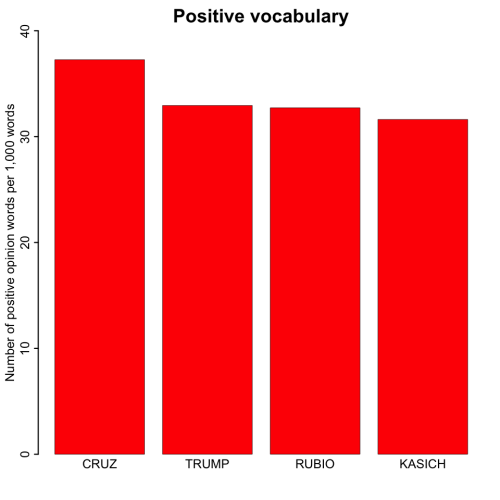
I hope, I think, I know: being assertive
The use of these thinking verbs (think, believe, know, wonder; sometimes called ontological verbs) has been correlated with perceived expertise and assertiveness: saying “Our healthcare system is broken” sounds more assertive and direct than “I believe our healthcare system is broken”. The graph below shows how often each candidate used the words know, think, believe, and wonder, including past and participle forms. Again, the figures are per 1,000 words to make them comparable. Trump and Kasich both use their share of thinking verbs, while Cruz and Rubio seem to quite actively avoid them.
